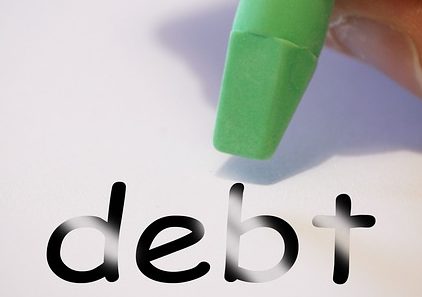Going Nuclear: Eliminating Debt Without Concern for Your Credit Score

If you’ve found yourself saddled with unmanageable debt and you’re trying to figure out what to do, one of your chief concerns might be preserving your credit score as much as possible. While this is certainly a worthy endeavor, sometimes it’s better to think long-term rather than short-term.
In a lot of cases, eliminating debt without concern for your credit score can get you back on sound financial footing much faster. What’s more, if you’re already in a situation in which you’ve missed payments, or have been late more than a few times, your credit score has already suffered.
At this point, it’s better to just focus on eradicating the obligations.
Let’s take a look at some of your best options.
Credit Counseling/Debt Consolidation
In nearly every case, entering a credit counseling program will mean closing your unsecured accounts. Issuers usually require this before they will agree to work with a counselor. After all, they want to make sure you don’t take advantage of the program to charge more after they’ve agreed to grant concessions.
This means your credit report will show some negative entries, which will make it difficult to get unsecured credit for up to five years, or until you successfully complete the program. You’ll also lose your unsecured credit history and have no activity over that period, so your score will also dip a bit.
However, this shouldn’t be much of a hindrance when it comes to qualifying for secured loans for a home and a car — assuming you complete the program successfully.
Debt Settlement/Debt Negotiation
If you qualify for debt settlement, your credit score has already taken a beating. Creditors will only take your request for negotiation seriously if you’ve been missing payments. And, they’ve already conveyed the nature of the situation to credit reporting agencies.
As a result, your credit score has already dropped, and your credit report reflects late payments too. Further, your accounts will be forwarded to collections before the process is complete. However, as dire as this all sounds, it’s better than the alternative, which is struggling to figure out how to deal with something over which you no longer have any semblance of control.
There’s more good news here. Working with a company like Freedom Debt Relief to settle credit card debt can put you on track to rebuild your credit much sooner than you could trying to pay your way out on your own. While they can’t help you fix your credit report, they can set you on the right path to rebuilding your score.
Once your settlement program is complete, your debt-to-income ratio will look very good to creditors considering you for loans. Just be careful to avoid getting back into the same problem.
Chapter 7 Bankruptcy
If your situation is such that neither of the above options is feasible, your only other choice will be to file for some form of bankruptcy protection. A Chapter 7 bankruptcy filing will be reflected on your credit report for 10 years. Despite this fact, some experts consider it the best option rather than the refuge of last resort.
After all, you’ll eliminate your unsecured debt immediately, with no lengthy program to endure. Further, you’ll find all sorts of credit offers in your mailbox within months of filing. Granted, the limits will be low, and the interest rates will be high, but they’ll be there.
Creditors will relish the opportunity to make you pay more for less. Plus, they know you won’t be able to get out of paying by filing for protection again for eight years.
Chapter 13 Bankruptcy
Here’s where things can get a bit medieval. The court will all but take control of your finances for about five years or so. During that period, you’ll have to ask a judicial trustee’s permission to apply for any new credit accounts — and they usually deny those requests. What’s more, your credit report will reflect this decision for seven years.
On the upside, you do get to keep a lot of assets you might have to forfeit under Chapter 7. Still though, you’ll surrender control of your life — and your credit score will suffer greatly.
These are your choices when it comes to eliminating debt without concern for your credit score. The good news is some of them are far worse than others. Deciding which one to choose is largely dependent upon your situation and your tolerance for inconvenience.

